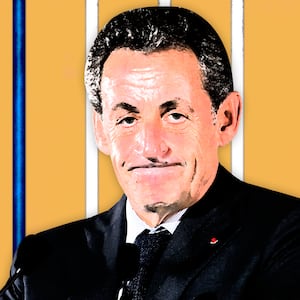Former French President Nicolas Sarkozy has been found guilty of influence peddling for attempting to bribe a judge. The enigmatic politician, whose dodgy friends and past scrapes with the law have won him infamy in Europe, was sentenced to three years in prison with two years suspended.
Sarkozy, who led France from 2007 to 2012, was famed for his marriage to Italian supermodel turned French-pop chanteuse Carla Bruni—his third wife—as well as for his political prowess. As part of the tranche of evidence used to convict the former president are tapes of intimate conversations made by Sarkozy’s former campaign adviser who fondly referred to him as “the dwarf” and by Bruni herself who reportedly often reminded him he was nothing short of a “kept man” thanks to her millions. He has the right to ask for his sentence to be served as house arrest.
Sarkozy, who still retains immense political sway in French conservative politics, was, for a time, tied to the deposed and now dead Libyan leader Muammar Gaddafi for whom he spent a night in a Paris jail after being arrested for taking as much as $60 million from the dictator. The cash was reportedly smuggled into France in suitcases with the help of a Franco-Lebanese businessman named Ziad Takieddine who dished about the weight of the currency to the French press. France has a cap of $26 million on donations and prohibits foreign donors altogether.
Takieddine, a former celebrity handler at the Isola 2000 ski resort near Nice, evolved to become a key arms broker between France, Pakistan, and the Middle East thanks to Sarkozy’s endorsement. He went to the press in 2012 and spilled Sarkozy’s secrets, telling French investigative media outlet Mediapart, “I discovered things that should no longer stay hidden.”
Gaddafi once pitched his famous Bedouin tent across the street from the Hotel de Marigny, the official residence for guests of honor during state visits, for the better part of a week. Sarkozy then betrayed him when he ordered France to lead the NATO efforts to oust Gaddafi in 2011. French planes dropped the first bombs that eventually led to his humiliating death. Sarkozy at the time was said to have pulled the trigger to tamp down concern that he, too, had gone rogue.
So worrying was the relationship that then-Secretary of State Hillary Clinton’s aide Sidney Blumenthal wrote her an eventually leaked email about Sarkozy’s erratic behavior, with the subject line: “France’s Client and Gaddafi’s Gold.”
The current charges for which Sarkozy was found guilty stem from an investigation into alleged discrepancies in campaign finances tied to his political party, but he will later be tried for allegedly taking Gaddafi’s cash when that case, which is still being investigated, goes to court.
He will also face a separate trial on March 17 with 13 co-defendants relating to another financial snafu in which he is accused of fraudulent overspending in his unsuccessful 2012 re-election campaign. His campaign is accused of spending more than $50 million—twice the maximum authorized in a French presidential campaign.
He was accused of asking magistrate Gilbert Azibert for information that would help his defense in exchange for a posh appointment in Monaco. Two of Sarkozy’s lawyers were also charged with the former president and received similar sentences.
At the trial, prosecutor Jean-Luc Blachon told the court, “The events would not have occurred if a former president, as well as a lawyer, had kept in mind the magnitude, the responsibility, and the duties of his office.”
The prosecution had requested four years in prison for the trio, asking that two years would be suspended in what he told the court was a “corruption pact.”
Sarkozy said in his defense that “no pact ever existed... either in my head nor in reality.” He then said he “wanted to be cleared of that infamy.”
Sarkozy’s lawyers were caught on wiretaps in 2014 discussing how to defend their client from claims he accepted illegal cash from L’Oreal heiress and France’s wealthiest woman Liliane Bettencourt during his 2007 presidential campaign. Sarkozy was found guilty of trying to get more information about that case from the magistrate.
Sarkozy told the court instead that he had “never committed the slightest act of corruption.” He said Monday he would appeal the conviction.






